Parenting is arguably one of the most important … is it a job? a task? a vocation? … that any of us will ever undertake.
And yet, what education or training do we receive to prepare us to do it well? Of course, we have the example of our own parents, but sometimes that is more a cautionary tale to counteract than a golden path laid before us. It’s daunting even when your child is herself golden. But how much more daunting when the child under your care is profoundly different from you and nearly all her peers?
This is the challenge that Andrew Solomon, Columbia University psychology professor, writer, and public intellectual, addressed when, following his powerfully thoughtful book about depression, “The Noonday Sun”, he wrote the bestseller, “Far From the Tree”, now an incredible documentary film by Rachel Dretzin.
What makes both “The Noonday Sun” and “Far From the Tree”, in both its literary and cinematic forms, so direct and powerful is the presence of Solomon himself. He wrote about his depression to open up the topic of depression (and visa versa); and he wrote about exceptional children and their parents because he was an exceptional child and is now a parent, thus allowing him to view the phenomenon from both angles. His particular uniqueness, besides his brilliance as a thinker, speaker and writer, is his homosexuality, remembering how when he was growing up just a few decades ago that being gay was considered an illness or infliction. The struggle of his parents to accept and understand his orientation, and Solomon’s own struggle, is what makes up his portion of the film’s story, but it is beautifully interwoven with several other remarkable lives:
There is 41-year-old Jason Kingsley, who has Down syndrome, and his elderly mother. Jason shares a home with two other men with Down syndrome, fashioning themselves as The Three Musketeers, and has a deep identification with Elsa from Frozen.
There is 23-year-old Loini Vivao, who was born with dwarfism, and travels to a Little People of America convention to find a friend who can truly understand her.
There is also Leah Smith and Joseph A. Stramondo, both Little People, who met and fell in love at such a convention. They are embarking on the path to parenthood and must consider the possibility that their children may be full sized.
There is Jack, a young boy with severe autism, and his parents, as both undertake heroic measures to hear each other.
Finally, and most heartbreaking, are the parents of Trevor, who when a teenager, brutally and randomly murdered an 8-year-old child. Here the focus is on the parents, who struggle to understand the actions of their child and their own culpability.
Any one of these stories would make an intriguing and powerful film, and one would think that combined them would overpower a single 93 minute film, but Rachel Dretzin does a masterful job of weaving them together. She does this, not by building to a dramatic or thematic note, than transitioning to the similar or like note in another story, but rather by moving from story to story in the natural rhythm of life, which is a seeming randomness that becomes meaningful on reflection and in context. And that reflection and context is provided by Solomon. Whenever we return to his story, and hear how clearly and insightfully he articulates what he experienced, the light of his understanding and wisdom, illuminates all the other narratives; the universal and human truths shine and heal.
I loved this film in so many ways, and on so many levels, that a single review could never say it all, for every day since seeing it, the truths it spoke rise up in me like reassurances of hope and humanity. Solomon once wrote about heroic kindness, and this film is an example of that noble trait. It is a gift to everyone who was ever a child. It is a gift to every parent. It is an act of love.
And as Solomon wrote, “Some people are trapped by the belief that love comes in finite quantities, and that our kind of love exhausts the supply upon which they need to draw. I do not accept competitive models of love, only additive ones.”

TV
Did JD from Scrubs Have a Dark Past?

TW: Discussions of child abuse and neglect.
The sitcom Scrubs ran from 2001- 2010 delighting viewers with the escapades of daydreaming Dr ‘JD’ Dorian and his friends. Unlike most TV sitcoms Scrubs perfectly balanced the comedic and the tragic. Being set in a teaching hospital with most of the main cast being doctors; there was plenty of fodder for some truly heart-wrenching storylines.
Like with most sitcoms, if you look under the jolly veneer (and have too much time on your hands) a much darker story emerges. In Scrubs, I would argue, this may be the past of its titular protagonist JD (played by Zach Braff). Some fans (ok, me) speculate that not only did JD have a less than ideal childhood but an abusive one.
Hints of this could be interpretated throughout the series:-
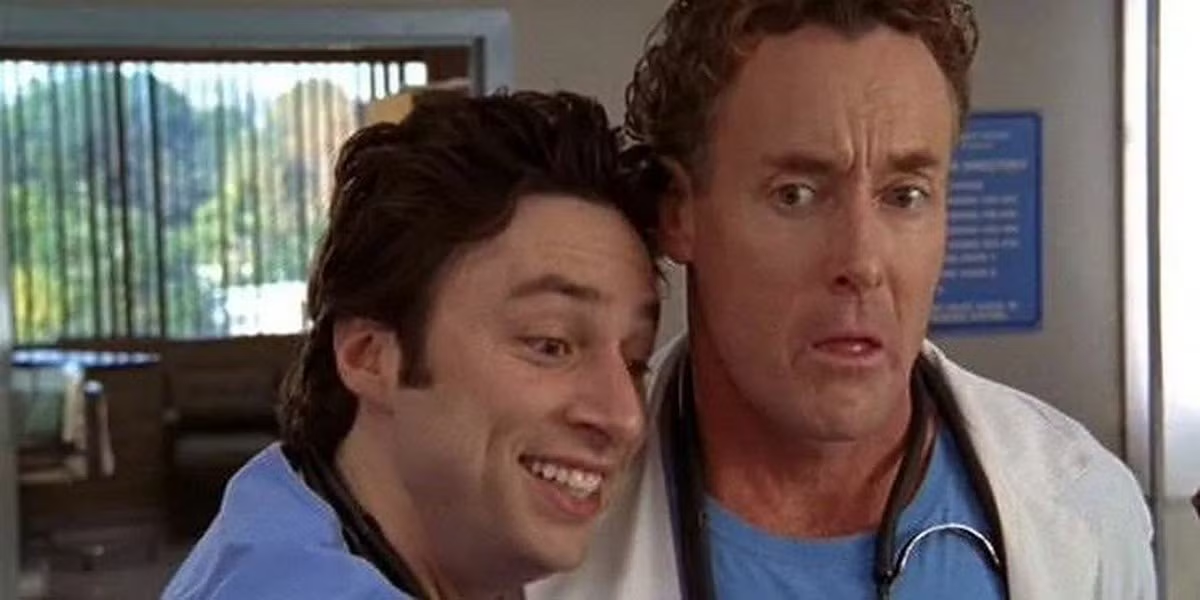
1. Attachment to Dr Cox
One of the most popular aspects of the series is the oddly touching relationship between mentor and mentee: Dr Cox (John C McGinley) and JD. It’s perfectly normal to admire and want to emulate an older colleague. But JD’s admiration of Dr Cox always seemed to go a step further. JD looked to the older doc as not only a mentor but a father figure.
JD explicitly states this throughout the series. Most notably in the finale; when during his much sought after hug JD claims Dr Cox smells “like a father figure”. This is odd as Dr Cox is only about 13 years JD’s senior. We know JD’s biological father (played by the late John Ritter) was pretty much absent during JD’s childhood. Is this yearning for a parental figure a way to fix JD’s damaged childhood?
As loathe as I am to criticise a fan favourite but Dr Cox openly mocks and belittles JD, almost never referring to his protégé by name. Instead by a vast archive of disparaging nicknames. The show does establish that there is love and respect om both sides, from Dr Cox deep down (deep, deep down). But why does JD not only put up with as well as seek out this treatment? Very masochistic. Or, has JD been subconsciously taught that taunts and aggression equate to love?

2. Feels Affinity with Dr Cox and Elliot
The show establishes early on that Dr Cox had an abusive homelife as a child. He openly reminisces about his parents being violent alcoholics. Is this the real reason that JD clamours for Dr Cox’s attention? Does JD see Dr Cox as an inspiration of someone who came from a similar background to his and became a well-respected doctor and family man?
Is the same true of JD’s on/off girlfriend, future wife and fellow doctor; Elliot? The show establishes that Elliot’s parents are mentally, emotionally, and financially abusive. Are JD and Elliot drawn to one another (partly) because they are both traumatised by their past? Even when it is proven time and time again that they are not suited.

3. Hostile Relationship with Older Brother
JD’s older brother Dan (Tom Cavanagh) appears several times in the show. Despite regularly visiting his kid brother, JD makes clear that these visits are not welcomed. JD’s ire is uncharacteristic as he’s shown as an ardent people pleaser throughout the show. Yes, Dan did bully JD throughout their childhood, though it’s unclear whether this was normal sibling rivalry or more.
In Series 3 Episode 5 ‘My Brother, Where Art Thou?’ JD attempts to cut off contact with Dan claiming that Dan never looked out for him. Even as children of divorce why is JD so upset his brother didn’t protect or “come through” for him? In the same scene JD comments about how their mother “married anyone that rang the doorbell”. Reading into this (hey, it’s what we’re here for) did Dan not protect JD from these multiple husbands?

4. Audience Never Actually See JD’s Mother
To me this is the most obvious that something is suspicious about the Dorian matriarch. Despite seeing every other cast members mother (except Dr Cox but its implied that his parents are dead) we never see JD’s. He, at the very least, seems to have a good relationship with his mother. Mostly speaks highly of her and she calls often. It doesn’t follow the trope many sitcoms use; having a character the audience never physically sees being used for comedic effect.
We hear JD’s mum (Barbara) speak in a flashback (Series 3 Episode 21 ‘My Self-Examination’). While Barbara was tucking young JD into bed she was saying some quite toxic things to her child, like how no women will ever be good enough for him. It is clear this scene is supposed to be somewhat creepy as Barbara is stroking the child’s face in an inappropriate manner. Adult JD even refers to his mum as “sexy” in the same episode. Very Freudian but in the light of everything else we are discussing: very disturbing!
5. JD’s Mother Drank
Linked to number 4 JD admits in Series 8 Episode 2 ‘My Last Words’ JD admits his mum “drank a lot”. Does this statement answer some questions about JD’s odd childhood?
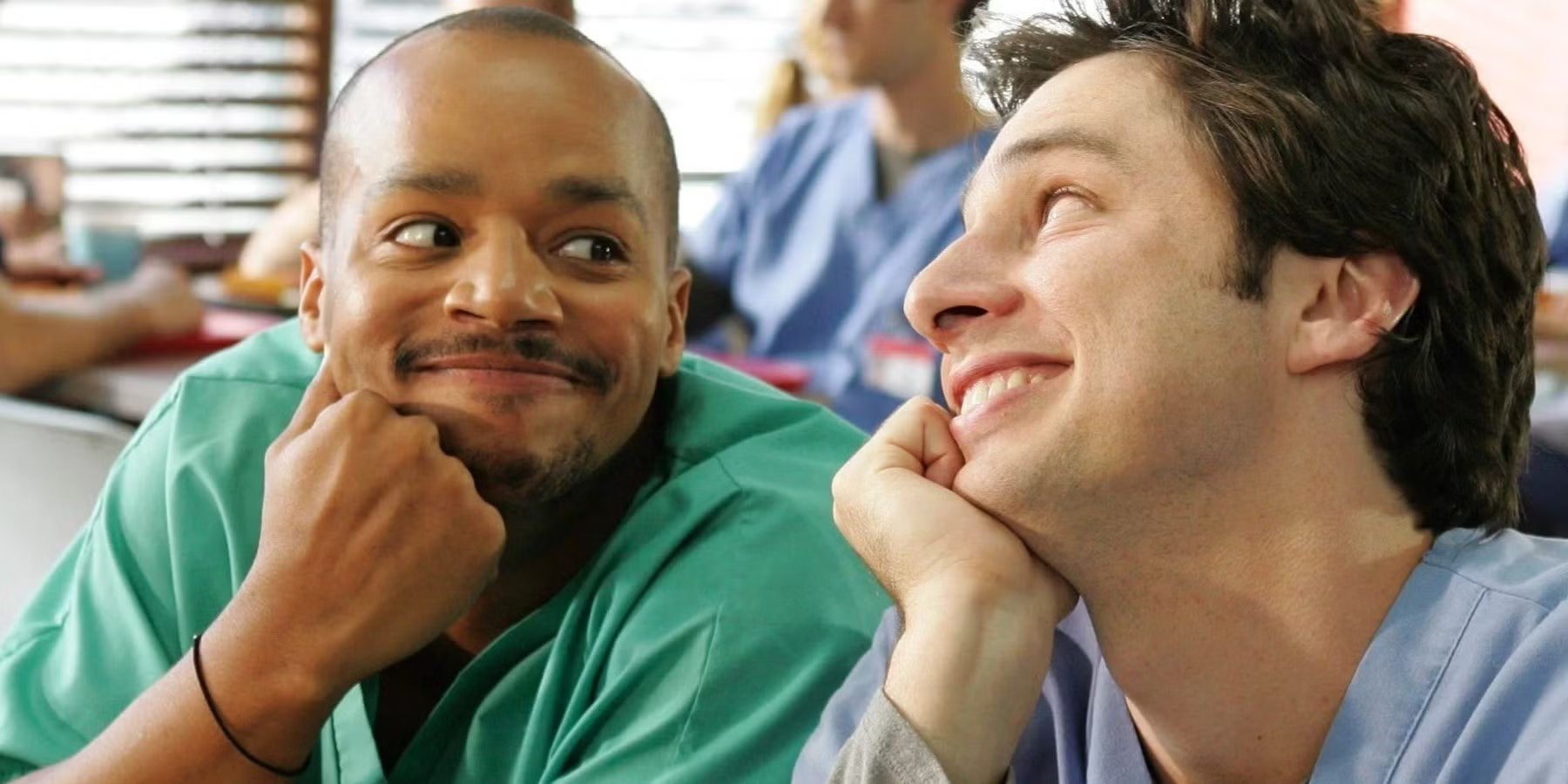
6. JD is a People Pleaser
As we have already mentioned JD is a pathological people pleaser (what’s that like?). As a doctor he goes above and beyond for his patients. He does everything from finding patients estranged family members (Series 4 Episode 11 ‘My Unicorn’) to shaving his head in solidarity with a chemo patient (Series 5 Episode 15 ‘My Extra Mile’). Of course this is all very commendable but JD particularly enjoys the gratitude. Why does he need this validation? Is this a coping mechanism from a turbulent background who had to go above and beyond to get the love that should have been unconditional?
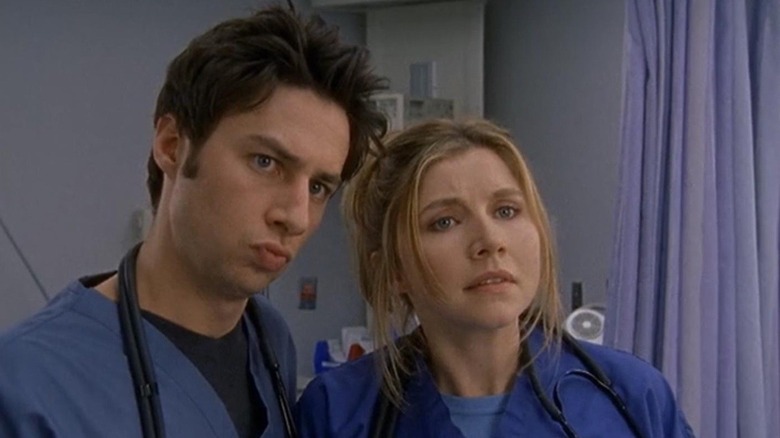
7. Extremely Tactile
Another of JD’s character traits is he extremely tactile. This is of course played up for comedy with his ‘sneak hugs’ (Series 6 Episode 13 ‘My Scrubs’) delivered to the stand-offish Dr Cox or the fact he has his friends on a ‘hugging schedule’ (Series 5 Episode 8 ‘My Big Bird’). Is this someone trying to seek the love and affection he never received in childhood? Or reassure himself that the people he loves won’t disappear?
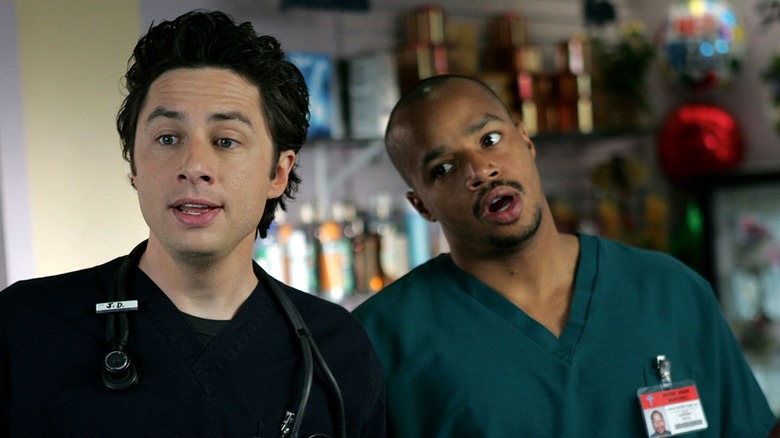
8. Self-Sabotaging
A common reaction to childhood trauma is self-sabotaging behaviour. In his romantic relationships JD has this in spades. Throughout the run of the show JD has more romantic partners than the rest of cast put together. It is acknowledged that JD goes from relationship to relationship with alarming speed and breaks them off for shallow reasons. Again, he may be trying to seek the love and security he never had in childhood.
JD’s damaged psyche is put on full display when after spending the majority of the series chasing Elliot she finally leaves her loving boyfriend for him. JD immediately decides he doesn’t want her anymore to many fans outrage (Series 3 Episode 20 ‘My Fault’).
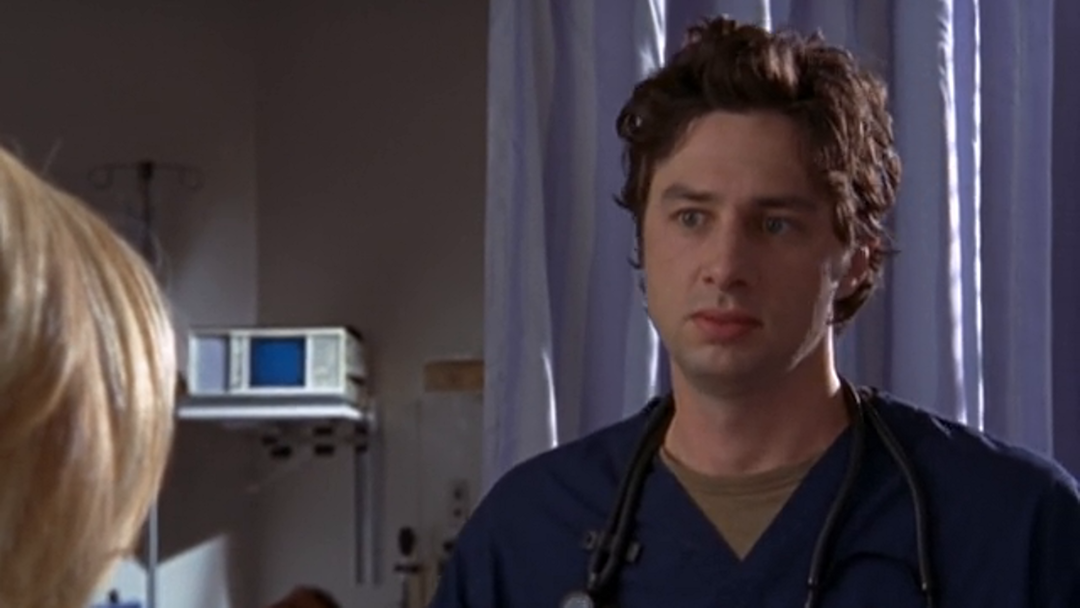
9. No Therapy
As well as never actually seeing his mother, we never see JD engaged in any kind of therapy. All of the other characters attend various types of therapy throughout the series. JD does not, despite arguably needing it the most. Is JD perhaps too scared of what therapy might uncover or not want to deal with his trauma head on?
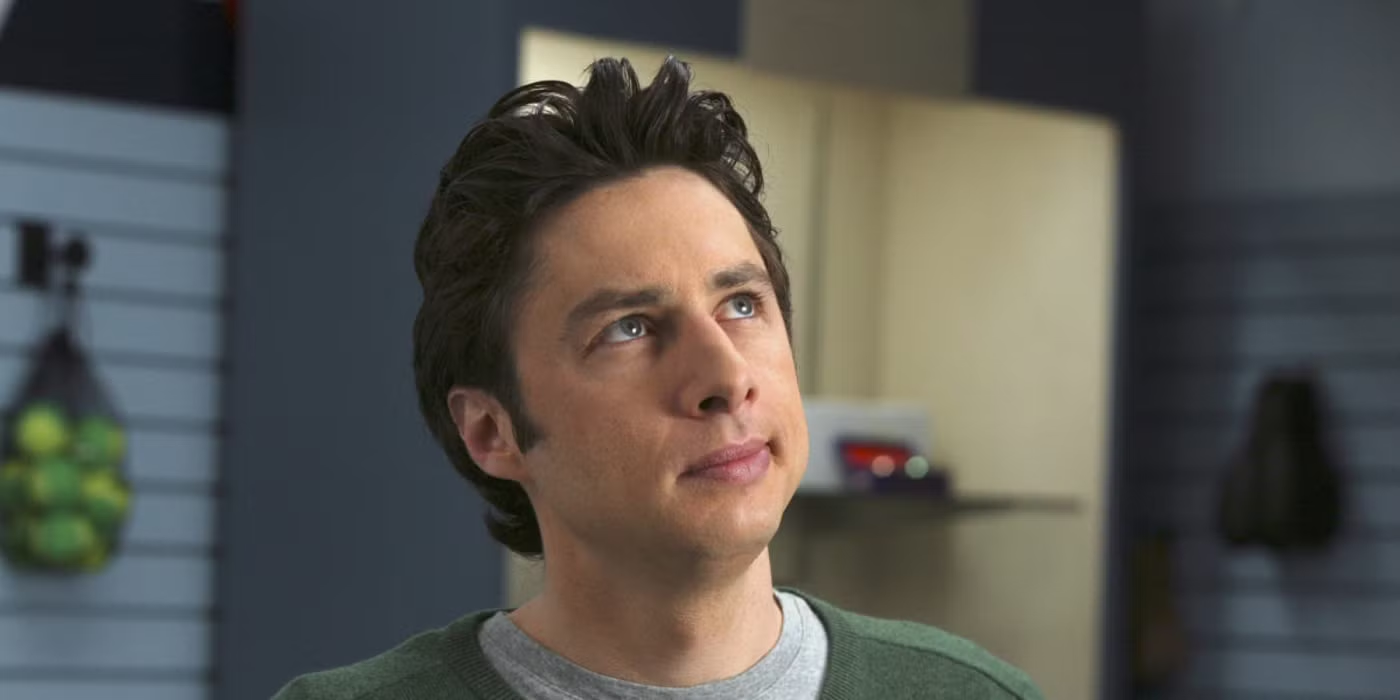
10. Overactive Imagination
During Scrubs entire run (except the final series thou shalt not be named) hinges on JD’s overactive imagination. His outlandish fantasies make for excellent comedy and unique sequiturs to break up the storylines. But what if this was yet another coping mechanism for the hapless leading man?
Children from challenging background often disappear into elaborate fantasy worlds in order to escape their surroundings. Is this a habit JD could never quite kick? It would explain why he doesn’t seem to have a lot of control of his daydreaming despite being an adult. It is a comfort and a way to deal with the difficult stuff life throws at him.
If any or all of these speculations are true Scrubs goes from being a mere half-hour sitcom to a story of one man’s triumph over his dark past. Despite his flaws and failings JD has still made something of himself and is surrounded by his chosen family; all of whom love him for who he is. This is extremely inspiring.
Movie
‘Mufasa: The Lion King’ Will Leave You Breathless

“Mufasa: The Lion King” is a visually stunning addition to the beloved Lion King franchise, offering a fresh and emotionally resonant take on the origins of one of Disney’s most iconic characters. The film beautifully explores Mufasa’s journey, balancing heartfelt moments with touches of comedy that lighten the mood and make the story accessible to audiences of all ages. The animation is breathtaking, capturing the vibrant landscapes and lush environments of the Pride Lands, adding depth to Mufasa’s character and his relationships.
The storytelling is compelling, effectively pulling at the heartstrings while providing insights into Mufasa’s character before he becomes the legendary king. However, the setup for Scar’s betrayal feels somewhat underdeveloped, lacking the deeper motivation that could have enriched their complex brotherly relationship. This missed opportunity leaves a slight gap in understanding Scar’s actions, which could have elevated the dramatic stakes.
The musical score is impressive, featuring memorable songs that enhance the emotional impact of pivotal scenes. While there are several standout tracks, one song, in particular, resonates deeply and is sure to linger in viewers’ minds long after the credits roll. Overall, “Mufasa: The Lion King” is an amazing film and a worthy addition to the Lion King lore that manages to deliver both laughter and tears, offering a rich tapestry of storytelling that fans will appreciate.
Movie
Is ‘Kraven the Hunter’ a Total Letdown?

“Kraven the Hunter,” directed by J.C. Chandor, aims to introduce a beloved Spider-Man villain to the big screen, but unfortunately, it falls short of expectations. The film suffers from noticeable issues, notably an overuse of ADR (Automated Dialogue Replacement), which detracts from the authenticity of the characters’ interactions and contributes to an uneven audio experience. This technical flaw is compounded by rough storytelling that feels disjointed and lacking in coherence, leaving viewers struggling to connect with the narrative.
Aaron Taylor-Johnson delivers a commendable performance as Kraven, showcasing the character’s gritty nature and complex motivations. His portrayal has potential, and it’s evident that he could elevate the character far beyond what is presented with a stronger script and direction. However, the absence of Spider-Man, a central figure in Kraven’s lore, leaves a void that the film struggles to fill. Without this critical connection, the plot meanders and fails to create the tension or stakes that fans of the superhero genre crave.
Additionally, including Rhino as a villain feels like a missed opportunity; he is presented more as a gag character with limited screen time, undermining any sense of threat or depth. For the average moviegoer, “Kraven the Hunter” might entertain but ultimately feels like a mediocre viewing experience. Comic book fans, however, may find disappointment in this lackluster attempt to create a solo character film. Instead of an exhilarating dive into Kraven’s world, the film presents a watered-down version, leaving audiences wishing for a more cohesive vision that honors its comic book roots.

